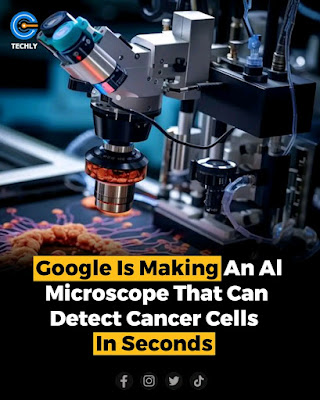Revolutionizing Cancer Diagnosis: Google's AI Microscope Detects Cancer Cells in Seconds In a groundbreaking leap towards advanced medic...
Revolutionizing Cancer Diagnosis: Google's AI Microscope Detects Cancer Cells in Seconds
In a groundbreaking leap towards advanced medical diagnostics, Google is at the forefront of developing an AI-powered microscope capable of detecting cancer cells with unprecedented speed and accuracy. This innovative technology holds the potential to revolutionize the field of pathology, significantly improving early detection and ultimately saving lives.
The Power of Artificial Intelligence in Microscopy
Traditional methods of cancer diagnosis involve manual examination of tissue samples under a microscope by pathologists. However, this process is time-consuming and may sometimes lead to human error. Google's AI microscope aims to address these limitations by leveraging the power of artificial intelligence (AI).
The AI microscope employs machine learning algorithms to swiftly analyze microscopic images of tissue samples. Trained on vast datasets of pathology images, the AI system can quickly and accurately identify abnormal cells associated with various types of cancer. This not only expedites the diagnostic process but also enhances the precision of cancer detection.
Swift and Precise Cancer Detection
One of the key advantages of Google's AI microscope is its ability to detect cancer cells in a matter of seconds. This speed is crucial in providing faster results to patients, enabling quicker decisions on treatment plans and improving overall prognosis.
The AI system excels in identifying subtle and complex patterns within tissue samples that might be challenging for the human eye to discern. By doing so, it significantly reduces the risk of misdiagnosis and ensures that potential cancer cases are identified promptly.
Integration with Healthcare Systems
Google is actively collaborating with healthcare institutions to integrate its AI microscope into existing diagnostic workflows. This seamless integration aims to enhance the efficiency of pathology labs, allowing for a more streamlined and automated cancer diagnosis process.
Pathologists, assisted by the AI system, can focus their expertise on more complex cases, while routine examinations are efficiently handled by the microscope. This collaborative approach not only accelerates diagnosis but also ensures a comprehensive and reliable assessment of patient samples.
Addressing Challenges and Ethical Considerations
While the development of Google's AI microscope brings immense promise, it is not without challenges and ethical considerations. Ensuring the security and privacy of patient data, addressing potential biases in the AI algorithms, and maintaining transparency in the decision-making process are paramount.
Furthermore, the integration of AI in medical diagnostics raises questions about the role of healthcare professionals and the need for ongoing training to adapt to these technological advancements.
The Future of AI in Healthcare
Google's endeavor to create an AI microscope for rapid cancer detection underscores the transformative potential of artificial intelligence in healthcare. As technology continues to evolve, collaborations between tech giants and healthcare providers will play a crucial role in ushering in a new era of medical diagnostics that is both efficient and highly accurate.
In conclusion, Google's AI microscope represents a significant stride towards revolutionizing cancer diagnosis, offering a glimpse into a future where cutting-edge technology plays a pivotal role in saving lives through early and precise detection of cancer cells.

















COMMENTS